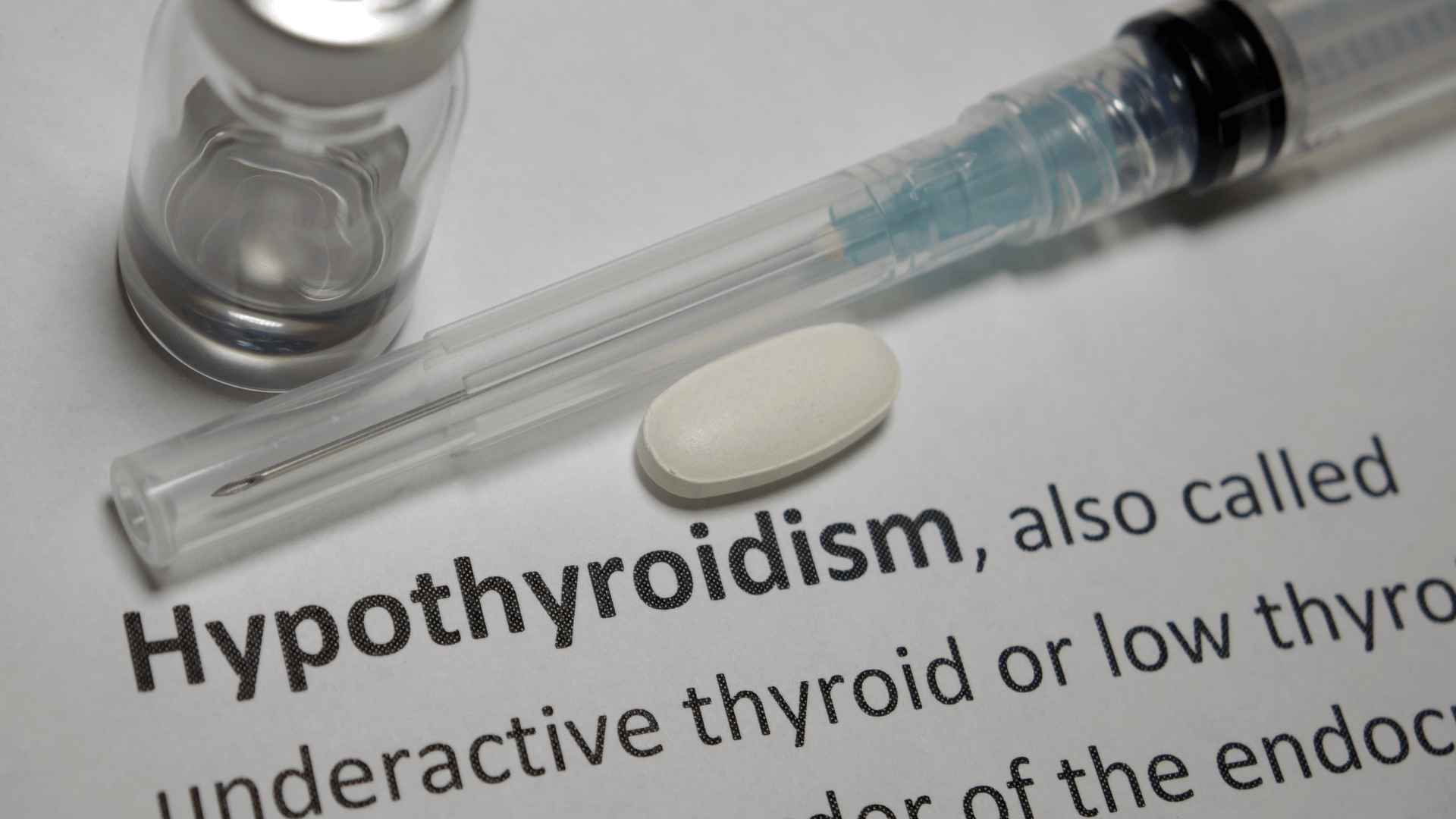Hypothyroidism is a condition in which the thyroid gland fails to produce enough thyroid hormone or an underactive thyroid, resulting in a slowed metabolism and various health issues. The amount of thyroid hormones in the bloodstream is controlled by the pituitary gland, which is located in the center of the skull below the brain. When the pituitary gland senses either a lack of thyroid hormone or too much, it adjusts its own hormone (thyroid stimulating hormone, or TSH) and sends it to the thyroid to balance out the amounts.
In hypothyroidism, the thyroid doesn't make enough thyroid hormone. The difference between hypothyroidism and hyperthyroidism is quantity. In hypothyroidism, the thyroid makes very little thyroid hormone. On the flip side, someone with hyperthyroidism has a thyroid that makes too much thyroid hormone.
The best food diet for people with hypothyroidism focuses on nutrient-rich foods that support thyroid function and promote overall well-being.
The thyroid gland plays a crucial role in regulating metabolism, energy production, and overall body functions. When it is underactive, as in hypothyroidism, individuals may experience symptoms such as fatigue, weight gain, dry skin, constipation, and sensitivity to colds.
While there is no specific "hypothyroidism diet," making certain dietary choices can help support thyroid health and manage symptoms. Here are some key considerations for a healthy diet for people with hypothyroidism:
Focus on Iodine-Rich Foods
Iodine plays a vital role in the production of thyroid hormones, which are crucial for maintaining a healthy metabolism and supporting various bodily functions. Incorporating iodine-rich foods into your diet can help ensure an adequate intake of this essential mineral. Here are some further details on the importance of iodine and the recommended iodine-rich foods for thyroid health:
- Seaweed: Seaweed, such as kelp, nori, and wakame, is one of the richest natural sources of iodine. Including seaweed in your diet can provide a significant boost to your iodine intake. You can enjoy seaweed in various forms, such as sushi wraps, salads, or added to soups and stews.
- Iodized salt: Iodized salt is table salt fortified with iodine. It is a common and easily accessible source of iodine. Using iodized salt in your cooking and seasoning your meals can help ensure sufficient iodine intake. However, it's important to use salt in moderation, as excessive sodium intake may have negative health effects.
- Seafood: Fish and shellfish, such as cod, tuna, shrimp, and lobster, are excellent sources of iodine. Including seafood in your diet provides not only iodine but also other essential nutrients like omega-3 fatty acids. Aim to incorporate seafood into your meals a few times a week to boost your iodine levels.
- Dairy products: Dairy products like milk, yogurt, and cheese can contribute to your iodine intake. However, the iodine content in dairy products can vary depending on the farming practices and the iodine content in the animal's diet. Choosing organic or locally sourced dairy products may ensure a more reliable iodine content.
It's important to note that while iodine is essential for thyroid health, excessive iodine intake can also be problematic. Therefore, it's recommended to meet the recommended daily intake (RDI) of iodine, which varies depending on age, sex, and life stage. Consult with a healthcare professional or registered dietitian to determine the appropriate iodine intake for your specific needs.
Include Selenium
Selenium is an essential mineral that plays a vital role in supporting thyroid function and maintaining overall health. Including selenium-rich foods in your diet can help against thyroid disease and ensure an adequate intake of this important nutrient. Here are some details on the importance of selenium and the recommended selenium-rich foods for thyroid health:
- Brazil nuts: Brazil nuts are one of the richest dietary sources of selenium. Just a few nuts a day can provide your recommended daily intake of selenium. However, it's important to note that Brazil nuts can vary significantly in their selenium content, so it's advisable to consume them in moderation to avoid excessive selenium intake.
- Tuna and sardines: These oily fish are not only excellent sources of omega-3 fatty acids but also provide selenium. Including tuna and sardines in your diet can offer dual benefits for thyroid health and overall well-being.
- Eggs: Eggs are a versatile and nutrient-dense food that contains selenium. They are also a good source of high-quality protein and various other essential nutrients. Adding eggs to your diet can contribute to your selenium intake.
- Legumes: Legumes such as lentils, chickpeas, and kidney beans are not only rich in plant-based protein and fiber but also provide selenium. Incorporating legumes into your meals can offer a range of health benefits, including supporting thyroid function.
It's important to note that the selenium content in foods can vary depending on the soil composition in which the plants or animals are raised. Therefore, the actual selenium content may differ based on farming practices and geographic location. Consuming a varied and balanced diet that includes a combination of selenium-rich foods can help ensure a sufficient intake of this important mineral.
As with any nutrient, it's crucial to achieve an appropriate balance. Excessive selenium intake can have adverse effects on health. It's generally recommended to meet the recommended daily intake (RDI) of selenium, which varies depending on age, sex, and life stage.
Prioritize Whole Foods
Opting for a diet rich in whole, unprocessed foods offers numerous benefits for overall health, including supporting thyroid function. Here are some key reasons why a diet focused on whole foods is beneficial for people with thyroid disorders and hypothyroidism:
Essential nutrients: Whole foods, such as fruits, vegetables, whole grains, lean proteins, and healthy fats, are naturally rich in essential vitamins, minerals, and antioxidants. These nutrients are vital for supporting optimal thyroid function and overall health.
Fiber Content: Whole foods are typically high in dietary fiber. Fiber aids in digestion, promotes a healthy gut microbiome and helps regulate blood sugar levels. It can also support weight management, which is important for individuals with hypothyroidism as weight gain is a common symptom.
Lower sugar and sodium intake: Processed foods often contain high levels of added sugars and sodium, which can have negative effects on thyroid health and overall well-being. Opting for whole foods helps minimize excessive sugar and sodium consumption, supporting a healthier diet.
Nutrient absorption: Whole foods are generally more bioavailable, meaning that the body can absorb and utilize the nutrients more effectively compared to processed foods. This ensures that your body can obtain the necessary nutrients for optimal thyroid function.
Anti-inflammatory properties: Many whole foods, such as fruits, vegetables, and healthy fats like avocados and olive oil, have natural anti-inflammatory properties. Chronic inflammation can impact thyroid health and contribute to various health conditions. By consuming a diet rich in anti-inflammatory foods, you can help reduce inflammation and support thyroid function.
When adopting a whole foods-based diet, focus on incorporating a variety of colorful fruits and vegetables, whole grains like quinoa and brown rice, lean proteins such as poultry, fish, and legumes, and healthy fats from sources like avocados, nuts, and seeds. Additionally, drink plenty of water to stay hydrated and support overall health.
Ensure Adequate Protein Intake
Protein plays a crucial role in supporting metabolism, maintaining muscle mass, and promoting overall health. Including lean protein sources in your meals is important, especially for individuals with hypothyroidism. Here's why protein is beneficial and some examples of lean protein sources to consider:
Metabolism support: Protein has a higher thermic effect compared to carbohydrates and fats, meaning it requires more energy to digest and metabolize. This can help boost your metabolism and support weight management, which is particularly relevant for individuals with hypothyroidism who may experience weight gain or difficulty losing weight.
Muscle maintenance: Adequate protein intake is essential for preserving muscle mass, which can be at risk in individuals with hypothyroidism. By including lean protein sources in your meals, you can support muscle health and prevent muscle loss.
Satiety and blood sugar control: Protein-rich foods tend to be more satiating, helping you feel fuller for longer and reducing cravings. Additionally, protein can help stabilize blood sugar levels, which is important for individuals with hypothyroidism who may be at risk of insulin resistance or blood sugar imbalances.
When incorporating lean protein sources into your meals, aim for a balanced diet that includes a variety of foods from different food groups. Combine protein with whole grains, fruits, vegetables, and healthy fats to create well-rounded meals.
While protein is important, it's also essential to have a well-rounded and varied diet that includes other essential nutrients from different food groups. Incorporating lean protein sources is just one aspect of a comprehensive approach to nutrition and overall well-being.
Be Mindful of Goitrogens
Goitrogens are substances that can potentially interfere with thyroid function, particularly in large amounts. While these foods are generally healthy and provide many nutritional benefits, it's important to be aware of their goitrogenic properties, especially for individuals with hypothyroidism. Here are some key points to consider:
Cruciferous vegetables: Vegetables like broccoli, cabbage, cauliflower, kale, and Brussels sprouts contain goitrogens. However, it's important to note that cooking these vegetables can significantly reduce their goitrogenic activity. Therefore, it's recommended to consume them in cooked form rather than raw, especially if you have a known thyroid condition.
Soy products: Soy contains compounds called isoflavones, which are considered goitrogens. However, the goitrogenic effects of soy are usually minimal when consumed as part of a balanced diet. Fermented soy products like tempeh and miso are generally better tolerated than unfermented forms like tofu. If you have concerns about soy consumption, consult with your healthcare professional for personalized advice.\
Millet: Millet is a grain that contains goitrogens. Like cruciferous vegetables, cooking millet can help reduce its goitrogenic activity. If you have hypothyroidism, it's recommended to consume millet in moderation and ensure it is properly cooked.
It's important to note that the goitrogenic effects of these foods are more relevant for individuals with pre-existing thyroid conditions or iodine deficiency. For most people, consuming these foods in moderate amounts as part of a well-balanced diet should not pose any significant issues. Cooking methods such as boiling, steaming, or stir-frying can help reduce the goitrogenic compounds and make these foods safe to consume.
It's always advisable to maintain a varied and balanced diet that includes a wide range of foods to ensure you receive all the necessary nutrients for optimal thyroid health.
Consider Gluten Sensitivity
For some individuals with hypothyroidism, there may be a connection between gluten sensitivity or celiac or autoimmune disease, and their symptoms. Gluten is a protein found in wheat, barley, rye, and other grains, and it can trigger an immune response in individuals with gluten sensitivity or celiac disease. Here's some information to consider:
- Gluten sensitivity and celiac disease: Gluten sensitivity refers to a non-celiac condition in which individuals experience symptoms when consuming gluten, but it does not cause the same intestinal damage as celiac disease. Celiac disease, on the other hand, is an autoimmune disorder triggered by gluten consumption that leads to damage to the small intestine.
- Shared symptoms: Some symptoms of gluten sensitivity and celiac disease can overlap with symptoms of hypothyroidism. These may include fatigue, gastrointestinal issues, joint pain, and brain fog. It's important to note that these symptoms can also be attributed to other factors, and a proper diagnosis is crucial.
- Exploring a gluten-free diet: If you suspect gluten sensitivity or celiac disease and its potential impact on your hypothyroidism symptoms, you may consider trying a gluten-free diet under the guidance of a healthcare professional or registered dietitian. This involves avoiding all sources of gluten, including wheat, barley, rye, and their derivatives.
- Monitoring for improvement: Adopting a gluten-free diet should be done with proper monitoring and guidance. Keep a food and symptom diary to track any changes in how you feel. It's essential to differentiate between the effects of a gluten-free diet and potential changes in thyroid medication or other factors affecting your symptoms.
- Testing for celiac disease: If you suspect celiac disease, it's important to get a proper diagnosis through specific blood tests and, if necessary, a biopsy of the small intestine. It's crucial to consult with a healthcare professional who can guide you through the diagnostic process and provide appropriate advice.
It's worth noting that there isn't a direct link between hypothyroidism and gluten sensitivity or celiac disease in all individuals.
Stay Hydrated
Proper hydration is crucial for overall health and plays a role in supporting thyroid function. Here's why staying adequately hydrated is important enough thyroid hormones, especially for individuals with hypothyroidism:
- Optimal thyroid function: The thyroid gland requires proper hydration to produce and release thyroid hormones effectively. Thyroid hormones play a vital role in regulating metabolism, energy production, and various bodily functions. Drinking enough water helps maintain the balance of fluids in your body, ensuring optimal thyroid function.
- Metabolism support: Adequate hydration is essential for a healthy metabolism. Proper hydration helps optimize the body's metabolic processes, including the conversion of food into energy. Maintaining a well-hydrated state can support metabolic function and may contribute to weight management, which can be beneficial for individuals with hypothyroidism who may experience weight-related challenges.
- Improved digestion and nutrient absorption: Water is essential for proper digestion and nutrient absorption. It helps break down food, aids in the absorption of nutrients, and facilitates the movement of waste through the digestive system. By staying hydrated, you support the efficient digestion and absorption of nutrients from your diet, ensuring your body receives the necessary nutrients for optimal thyroid and overall health.
- Temperature regulation and energy levels: Water plays a vital role in regulating body temperature, especially during physical activity or in hot weather. Proper hydration helps maintain your body's temperature balance, which is important for overall comfort, energy levels, and overall well-being.
To ensure you stay adequately hydrated, consider the following tips:
Drink water throughout the day: Aim to drink water consistently throughout the day rather than relying on large amounts at once. This helps maintain a steady hydration level.
Listen to your body: Pay attention to your body's signals of thirst and drink water when you feel thirsty. Additionally, keep in mind that certain factors like physical activity, climate, and certain medical conditions may increase your need for fluids.
Monitor urine color: Check the color of your urine as a general indicator of hydration. A pale yellow color indicates proper hydration, while darker yellow or amber-colored urine may indicate dehydration.
Consider other hydrating fluids: In addition to water, you can also hydrate with herbal teas, infused water, and other hydrating beverages that do not contain excessive amounts of caffeine or sugar.
It's important to note that individual fluid needs may vary depending on factors such as age, activity level, climate, and overall health. It's always a good idea to consult with a healthcare professional or registered dietitian to determine your specific hydration needs and ensure you're meeting them appropriately.
By maintaining proper hydration, you support not only your thyroid function but also your overall health and well-being. Make it a habit to drink enough water throughout the day to reap the benefits of optimal hydration.
While a healthy diet is beneficial for individuals with hypothyroidism, it's essential to work closely with a healthcare professional or a registered dietitian to personalize your dietary plan based on your specific needs and health goals. They can provide individualized guidance and monitor your progress to ensure optimal thyroid health.
Remember that diet alone cannot replace medical treatment for hypothyroidism. If you suspect you have hypothyroidism or have been diagnosed with the condition, consult with a healthcare professional for proper diagnosis, treatment, and ongoing management.
For more information on Vista Residences, email [email protected], follow @VistaResidencesOfficial on Facebook, Twitter, Instagram, and YouTube, or call the Marketing Office at 0999 886 4262 / 0917 582 5167.










